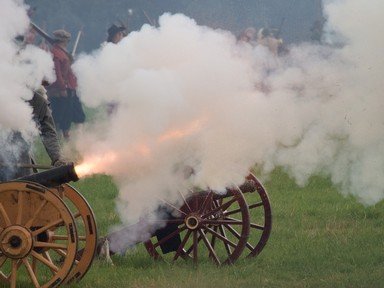Quiz Answer Key and Fun Facts
1. The Angles, Saxons, and Jutes swaggered over to Britain soon after the Romans left in the 5th century. These groups had a similar language and loved a good fight. Why did they most likely come?
2. The Angles, Saxons, and Jutes had enjoyed being blood-thirsty heathens for many centuries. Popes in Rome, however, were adamant that the wealthy pillagers should convert to Christianity. How did this conversion happen?
3. The Anglo-Saxons are (sometimes unjustly) thought of as a bunch of illiterate brutes. They did, however, leave behind a rich literary tradition. What type of literature did they NOT create?
4. Amidst the strangely-named rulers of Anglo-Saxon England, like Offa and Ethelberht, arose a sensibly-named king called Alfred. He defended England from invaders and issued helpful laws. What other triumph is laid at his feet?
5. The structure of Anglo-Saxon society was strictly controlled by birth. If a person was foolish enough to be born a peasant, he or she would be stuck in that role for life.
6. Sometimes the Anglo-Saxons took a break from trying to kill one another in order to commemorate special days. What was the primary way in which the Anglo-Saxons celebrated?
7. "Might makes right" was often the motto in Anglo-Saxon England, but there were laws issued to protect everyone. Lawbreakers faced all of the following punishments EXCEPT:
8. Though the Anglo-Saxons had invaded and defeated the Britons, they didn't much appreciate the Scandinavian Vikings who did the same to them. They eventually had to accept one Viking as their king for nearly twenty years. Who?
9. By 1066, Edward the Confessor was the sole surviving son of the house of Wessex. All of his brothers had died through wars, murders, and sometimes even natural causes. What was the biggest impact of the royal family's decline?
10. The Anglo-Saxons had come to Britain as big, blond bullies. They engaged in battles and bloodshed. Eventually, they created a unique culture and ruled for hundreds of years. What event effectively ended the Anglo-Saxon era?
Source: Author
Pagiedamon
This quiz was reviewed by FunTrivia editor
bloomsby before going online.
Any errors found in FunTrivia content are routinely corrected through our feedback system.


